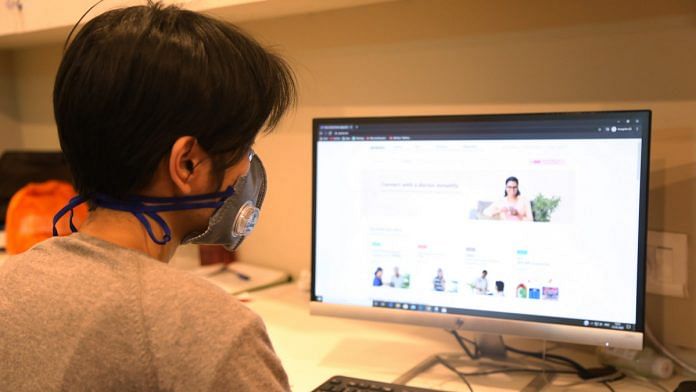New Delhi: Children won’t have to sit for hours in front of the laptop or desktop for online learning, with the Modi government set to come up with an Standard Operating Procedure (SOP) to end this practice.
ThePrint has learnt that the Ministry of Human Resource Development is working on guidelines for the way schools can impart digital education, with the measure coming after the ministry received complaints about schools running online classes like regular school, making children sit in front of electronic devices for seven to eight hours.
The guidelines are meant to solve the issues currently being faced by all stake-holders — teachers, parents and students.
School Education Secretary Anita Karwal spoke about the guidelines on Friday at the K12 virtual conference by Ashoka University, a conference discussing the future of schools in light of Covid-19 pandemic. “We are coming up with SOPs on digital education for schools,” Karwal said during her address.
Explaining the reason behind the guidelines, she said, “There has been an upsurge on this (digital education) and also an uproar on the way some schools are doing it… Some schools have simply replicated the time table and the child is sitting in front of the device for seven to eight hours.”
She added that there were concerns from the parents that some households have just one device and it can’t be given to all the children for classes. She further said that there were some unfortunate incidents as well during the online classes. While Karwal did not elaborate on the unfortunate incidents she referred to, there were reports from some states that teachers were being harassed by students during online classes.
All these concerns will be taken care of while formulating the guidelines. “The guidelines will be released only after the school safety guidelines,” Karwal added.
Schools following their own digital pattern
There are no SOPs for digital learning in India. As a result of this, each school has been following its own pattern. While some schools are teaching their students through online platforms like Zoom and Google Meet, others are relying on WhatsApp.
The SOP for digital education is, however, likely to set a standard format for schools to follow, as schools will work on a blended learning model in the coming days. Blended learning is an approach to education that combines online learning along with face-to-face classroom teaching.
“Now there will be a lot of homeschooling, blended schooling, a bit of learning at homes and a bit in schools,” Karwal said during her address.
The HRD Ministry has also prepared safety guidelines for re-opening of schools, which include directions for schools to follow and ways to maintain physical-distancing in classrooms.
Also read: Less social media and news, play more Snakes & Ladders: Govt’s de-stress guide for students




How many students are benefiting from online classes. Who is going to check?
YES SCHOOL COULD BE CUT DOWN TO ONLY 4 HR OR 3HR MOSTLY AND LESS HOMEWORK GIVEN
My children are not stressed, since the school has a portal where the study material is uploaded, with videos.
The kids are given written work, of which they take fotos and send it to the teachers through mail or whatsapp.
Enough time is given for the kids to complete the work.
These are then evaluated and feedback is given to students.
My daughter got admission in nursery at DPS, Siliguri in West Bengal. She hasn’t seen her school premises yet and at such young age online classes can be a forced compromise, not solution. On another note, why do we have to pay the transportation fees also in full–transportation fees should be 50%. Nobody thinks about the self employed people.
Now a day’s schools are ment for business and it’s very good business. Even though government has ordered not take admission fees but I think almost all schools are included that into term fees like that they are doing business with parents.
It would be better if the government scanned the text books and relay it on the doordharshan so that children can view it along with their elders instead of using Android. During this relay, the other channels need not display their programmes or take up along with doordharshan for few hours. Since India is a multilingual country ,it would be appropriate to stand as one to make a better society,.As goes the saying Unity in diversity or United we stand, divided we fall, this is the right time to prove it.
Useless pattern forcing the students for online classes… cunning plan to collect the school fees in a hidden trick…all the students must possess android smartphones for the classes… impossible
Children as well as parents want to continue studies in the same school. As usual ,fees should to paid , whether instruction is online or off-line. Teachers are working and school administration observing guidelines received from state boards/HRD ministry. It can not be exempted.
Very true. The timetable reflects 8am to 3.30pm with short breaks. Each teacher gives their own homework and the child gets loaded with homework. No physical activity and load of home task is the cause of their stubborn behavior.